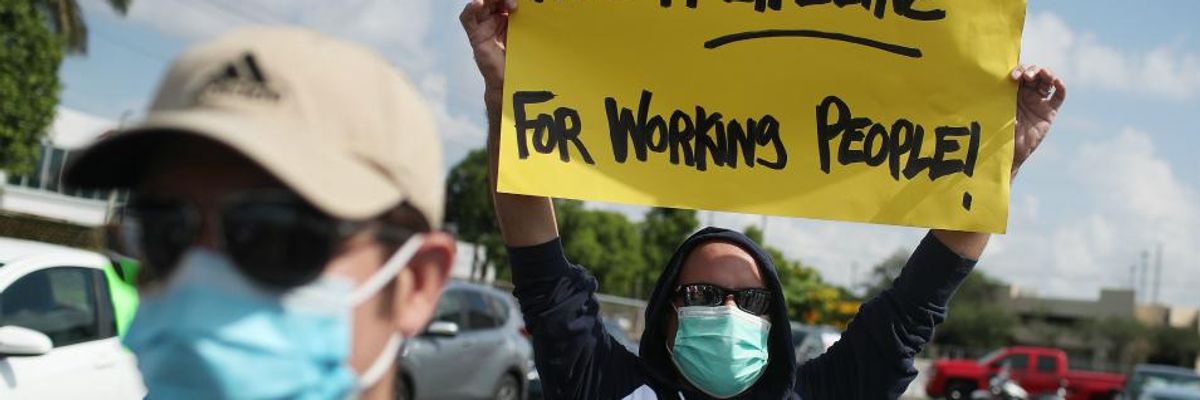With the coronavirus pandemic and resulting economic crisis continuing to throw hundreds of thousands of people out of work each week, more than a million Americans are reportedly still waiting on their first unemployment check thanks in large part to a fragmented U.S. benefit system that has been marred by years of inadequate funding, outdated technology, and right-wing attacks.
The Washington Postreported Monday that more than 1.2 million Americans have been "stuck waiting months for desperately needed aid as states struggle to catch up with backlogs of unemployment claims stretching back to March."
"People's claims have been held up for months at times for something as simple as a typo or uploading a scan of a driver's license instead of a photo," the newspaper noted. "Most delays are the result of three key factors: extensive fraud prevention checks, antiquated computer systems, and applications being flagged for extra scrutiny. Claims set aside for manual review often take months to resolve."
Creaky and badly prepared unemployment systems have struggled to handle the unprecedented torrent of jobless claims that began in mid-March and has continued for 41 consecutive weeks, with lawmakers at the national level doing little to help states upgrade their technology.
The coronavirus relief measure that President Donald Trump belatedly signed into law last month doesn't include any money for state unemployment offices to upgrade their computers, meaning that applicants could continue to face significant delays as they attempt to obtain the $300-per-week federal unemployment boost offered under the new package.
According to the latest figures from the Labor Department, nearly 20 million Americans are currently receiving or have filed for unemployment benefits. With tens of millions of people struggling to afford rent, food, and other necessities, even short delays in benefit payouts could have devastating consequences.
"It is an outrage that over 1 million workers who lost jobs during the pandemic haven't received the benefits they earned and deserve," Sen. Bernie Sanders (I-Vt.) tweeted Monday. "We must make it easier, not harder, for workers to receive these benefits. And, yes, the working class needs $2,000 a month until the crisis ends."
HillTV's Krystal Ball blamed "decades of anti-government politics" for the massive unemployment backlogs and other U.S. failures amid the ongoing coronavirus crisis.
"We literally cannot do anything," Ball said. "We can't fight a pandemic, we can't administer stimulus, we can't distribute a vaccine. Special thanks to all the free market fundamentalists who made it happen."
In an October report, The Century Foundation, the National Employment Law Project, and Philadelphia Legal Assistance noted that the Covid-19 pandemic "has laid bare the struggling technology holding up our unemployment systems and the harm to workers when they cannot navigate or access their unemployment benefits."
"While some states have undertaken modernization projects, many encountered significant problems and workers paid the price through inaccessible systems, delayed payments, and even false fraud accusations," the groups said. "The Covid-19 pandemic, which led to an unprecedented spike in unemployment claims, has further exposed the weaknesses in these systems and the difficulties workers face with their unemployment claims."
Under the U.S. unemployment system, states have significant freedom to intentionally make it more difficult for residents to apply for and obtain jobless benefits. An adviser to Florida's Republican Gov. Ron DeSantis told Politico last year that the state's unemployment system--which recently ranked second-worst in the nation at paying benefits on time--was intentionally designed to deny people aid.
"It's a shit sandwich, and it was designed that way by Scott," said the DeSantis advisor, referring to Florida's former governor Sen. Rick Scott (R-Fla.). "It wasn't about saving money. It was about making it harder for people to get benefits or keep benefits so that the unemployment numbers were low to give the governor something to brag about."
But Florida's hardly alone in making matters difficult for people seeking relief after losing their jobs. The Post tells the story of Josh Vaughn, a Georgia bartender who was furloughed in March and waited nine months to receive jobless benefits.
"In April, Vaughn received a letter saying he qualified for $320 a week, but then his file was put on hold until he proved his identity," the Post reported. "The fraud check process took nearly six months to clear up. But Vaughn, who is now decorating cakes and stocking shelves at a grocery store, a job that pays about half what he made as a bartender, was still waiting in December for his unemployment benefits... Vaughn finally received $14,000 in unemployment on Dec. 31--a few days after the Post inquired about his case."
Arindrajit Dube, professor of economics at the University of Massachusetts, Amherst, argued Monday that the current benefit crisis underscores the need to completely federalize the U.S. unemployment system.
"We need to make UI a fully federal program, like Social Security. There is little reason to have this broken fed-state partnership," Dube wrote. "This is not a difficult policy problem to solve. This is a straightforward policy change that Congress can and should start working on in 2021."

